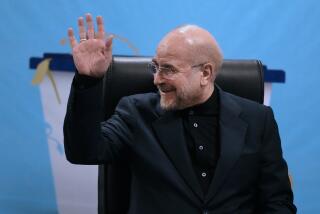Egypt presidential race gets new twist: Mubarak-era figure surges
- Share via
CAIRO — The race for Egypt’s president is tightening as a surge by a former prime minister has raised fresh conspiracy theories that remnants of deposed leader Hosni Mubarak’s regime are angling for power.
The first round of voting begins Wednesday, but many Egyptians are still undecided in what is largely a contest between Islamists and two men connected to the old regime. The drama has been intensified by a last-minute swell in popularity for Ahmed Shafik, a retired air force general appointed prime minister in the weeks before Mubarak’s government fell last year.
The country’s first free presidential election has offered a confusing and tantalizing civics lesson for Egyptians moving closer to a democracy that is expected to end 15 months of military rule. It is unclear how much authority the generals will cede, but the nation, after enduring six decades of autocrats, is slipping erratically into a more politically open era.
Recent polls suggest a close election that will probably lead to a runoff. The top contenders are Amr Moussa, a secularist and former foreign minister, and Abdel Moneim Aboul Fotouh, a liberal Islamist. Gains by Shafik and Hamdeen Sabahi, a left-leaning nationalist, have jolted the race, highlighting varying political ideologies and growing suspicions over Islamist candidates.
Shafik represents Egyptians weary of demonstrations and nostalgic for the law-and-order days of Mubarak. His policies to fix the country’s deep economic problems are sparse on detail. But his belligerence toward protesters — he’s threatened to stop persistent rallies in Tahrir Square by cutting off electricity — has turned him into a dapper folk hero for the loyal and increasingly miserable old guard.
“A considerable number of Egyptians follow the saying, ‘A harm we know is always better than a benefit we don’t know,’” said Maher Hammad, a political science professor at Tanta University. “In the way he speaks, dresses and thinks, Shafik is regarded by many as a typical Mubarak bureaucrat who won’t force revolutionary change.”
He said Shafik’s supporters “want the same way of living they had under Mubarak, with no care for any sort of freedoms or political rights. Fear has done wonders in how these people think.”
Shafik has survived corruption allegations and an attempt to disqualify him from running. His rise in the polls has prompted critics to suggest he’s receiving help from the military-controlled state media. Yet he’s unlikely to overcome the stigma of his ties to Mubarak. Protesters often swarm his rallies — one man hurled a shoe at him — and his support outside Cairo is uncertain.
The expected scenario is that Shafik may be a spoiler, draining votes from Moussa and boosting Aboul Fotouh, who is struggling to appease liberals and ultraconservative Salafis. The enthusiasm Aboul Fotouh’s self-described consensus candidacy attracted months ago has diminished in recent weeks over doubts that he can represent such diverse, and often antagonistic, political and religious interests.
What is less clear, however, is the fate of Mohamed Morsi, a California-educated engineer running as the Muslim Brotherhood candidate. Polls suggest that Morsi has dropped to fourth or fifth place over a backlash against the Brotherhood, which controls nearly 50% of the seats in parliament, for breaking political promises and its lack of inclusion.
But the Brotherhood is the best organized political machine in the country. It is respected by many Egyptians for its years of opposition to Mubarak and a network of social programs that stretch from inner-city neighborhoods to the provinces. Morsi is likely to do well among the poor and Islamic conservatives, whom he has heavily courted at campaign stops.
“We want a president who we can tell, ‘Fear God and his law and judge according to his book,’” Safwat Hegazy, a cleric supporting Morsi, was quoted as telling a rally by the Egyptian Independent news website. “We want a president who will free Palestine and Jerusalem [and] tell the world that the law of God has returned in Egypt.”
The next president may not be as powerful as Hegazy envisions. The drafting of a new constitution has been delayed. The army has indicated it will soon amend the existing constitution to deepen its authority, including outlining presidential powers, limiting government oversight of its budget and defining parameters for declaring war.
The measure will give “the army supreme authority,” Mohamed ElBaradei, an opposition leader and Nobel Peace Prize laureate, tweeted over the weekend. “Without a constitution, things will continue to deteriorate.”
The army has promised to hand power to a civilian government by July. That transfer will indicate whether the new president can break the bonds of the past or whether the leader of the most populous Arab nation will be weakened by a military that relinquishes the limelight but not control.
“This is all very tricky and very dangerous,” said Sherif Sameh, an architect. “Voters want someone they personally trust … but most of the candidates are obviously not speaking their minds and we don’t know their intentions.”
Amro Hassan of The Times’ Cairo bureau contributed to this report.
More to Read
Sign up for Essential California
The most important California stories and recommendations in your inbox every morning.
You may occasionally receive promotional content from the Los Angeles Times.














